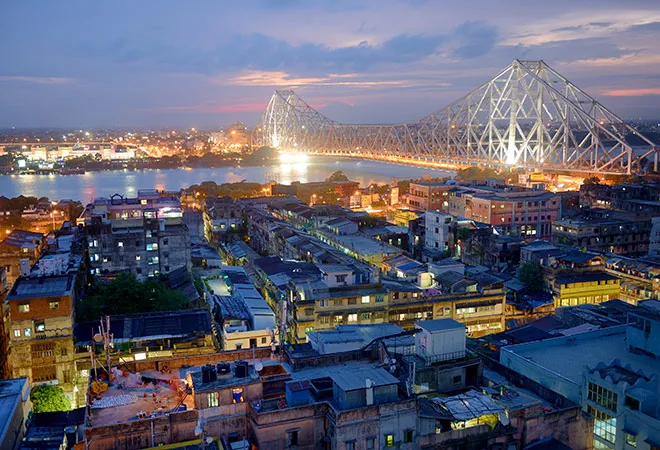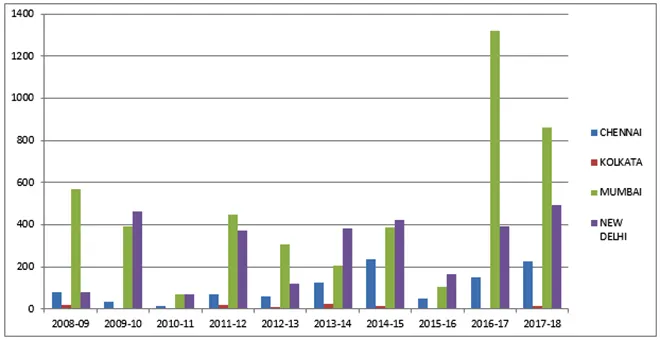
Cities that are often defined by cultural leadership or economic strength have been prominent throughout history. From Athens being known as the first ‘European City of Culture,’ to the sovereign city-state of Singapore being accorded one of the strongest financial hubs in Asia, evidences are abundant. Closer to home, Mumbai is India’s ‘financial centre’, while Kolkata is touted to be the country’s ‘cultural capital’. In fact, in January 2021, while addressing a political rally in Kolkata, Chief Minister Mamata Banerjee said, “I believe that India must have four rotating capitals. The English ruled the entire country from Kolkata. Why should there be only one capital city in our country?” The rise of unique city systems has not always been dominated by the issues of sovereignty, but is mostly driven by the historical perceptions and political capital that surround them.
There is no doubt that Kolkata holds the potential to evolve into an essential node of economic activity and governance—both at a domestic and an international level—by virtue of its geographhical proximity to Southeast Asia and because it is the largest and most well-connected city in the eastern region. As the world reels under the COVID-19 pandemic, cooperative Centre–State interactions within federalist structures are required to be more seamless than ever before. In this context, it will, therefore, be interesting to see if and how cities such as Kolkata will grow to prominence in the post-pandemic global order.
FDI inflows: A key barrier
West Bengal has been perceived to be averse to industrialisation time and again. In 2010-11, the idea of development of Special Economic Zones (SEZs) did not sit well with the West Bengal polity and all the opposing political parties involved in the state tried to score political mileage during the protests in Singur and Nandigram. The opposition to land acquisition for SEZs gained so much momentum that it overturned Bengal’s Communist government of 34 years in 2011 making way for the current Trinamool Congress-led state government. As of February 2020, India had 240 operational SEZs, of which only seven are in West Bengal as compared to 32 in Maharashtra. Therefore, in order for Kolkata to be regarded as an economic hub, a large inflow of foreign and domestic capital is required in sectors ranging from physical infrastructure to human capital formation.
Among the Foreign Direct Investment (FDI) inflows in the major cities of the country over a period of 10 years (2008-18), Kolkata has one of the least amounts of growth as compared to other metropolitan counterparts such as Delhi, Mumbai, and Chennai (see figure 1). However, given its advantageous geographical location, Kolkata has immense potential to evolve as a prominent hub of economic activity, not only in eastern India, but the entire South and Southeast Asia. First, the strategic location of the city makes it convenient to catalyse the process of integrating the larger markets of Southeast Asia with those of mainland India; and secondly, the ability to mobilise the large endowments of physical, social, human, and natural capital available in eastern India.
Figure 1: FDI Inflow into Reserve Bank of India’s Regional Offices (in INR billion)
 Source: Author’s own; data from Ministry of Commerce and Industry, Government of India
Source: Author’s own; data from Ministry of Commerce and Industry, Government of India
Cities as units of diplomacy
A framework of para-diplomacy or ‘city-diplomacy’ to be specific, wherein the institutions mobilised by the city, such as the local governments, state government, or even the civil society, could engage in international networks on a global political stage with the aim to represent the regional as well as national interests is well-suited to Kolkata. Such engagements could be in the fields of national security, sustainable development, economic partnerships, cultural ties, administrative networks, and city representations. In fact, there are various methods of implementing para-diplomatic frameworks—which range from setting up of consular offices in cities to the setting up state foreign affairs offices which will be under the supervision of the Ministry of External Affairs.
In the context of India’s Act East Policy (AEP), eastern and north-eastern cities such as Kolkata and Guwahati, play a crucial role in enhancing regional ties as ‘gateways’ to Southeast Asia via Myanmar and Thailand. This could lead to these eastern cities and regions emerging as key units of deploying and engaging in the country’s foreign outreach alongside the creation of alternative frameworks of city-diplomacy across governance regimes.
The Kolkata port can play a major role in the organic integration of the Bay of Bengal Initiative for Multi-Sectoral Technical and Economic Cooperation (BIMSTEC) and Bangladesh, Bhutan, India, Nepal (BBIN) regions. The Kolkata port played a dynamic role during the British regime, while it lost its former vitality in the post-independence years, together with the Haldia port, Kolkata continues to be the nearest seaport for landlocked Nepal and Bhutan. The Kolkata port’s ability to attract business and handle larger volumes of cargo will depend on its participation in port-led development initiatives like Sagarmala. Bilateral and multilateral projects to connect the port such as the Kaladan Multimodal Project to connect India and Myanmar; the Asian Trilateral Highway to connect India, Myanmar, and Thailand; and the BBIN Motor Vehicles Agreement have not been effectively materialised yet. However, the latest 2019 Memorandum of Understanding (MoU) signe between the port trusts of Kolkata, Vishakhapatanam, and Chennai and the Ranong Port, Thailand, gives a glimmer of hope.
The high trading dependency of Bhutan and Nepal on the region should also be utilised as it would prove to be beneficial for India on both economic and strategic ends. The city’s proximity to the various BIMSTEC and BBIN regions and its well-established connections with the different parts of India gives it a natural advantage to connect to those markets, and not to mention the potential of freshwater cooperation with industrial hinterlands of the region through the National Waterway 1.
A case for cooperative federalism
While cities may be hubs of economic activity, there is still not enough financial autonomy. For example, municipal financing in Indian cities is one of the main causes of local governments being at loggerheads with each other. The 74th Constitutional Amendment conferred functional autonomy but inadequate financial autonomy to local governments. Consequently, there is lack of revenue to keep up with the increasing pace of population growth in cities. This results in high dependency on state governments for financial resources, which has been grossly inadequate. In this context, elections to the Kolkata Municipal Corporation (KMC) this year is also of utmost importance. Hence, the political dynamics between the parties being elected at the KMC and the state legislative assembly with the union government will also have direct bearings on the socio-economic and infrastructural progress in Kolkata in the near future.
Since a city’s prominence is attached to its cultural and economic well-being, Kolkata requires serious advancement in conducting amicable politics and good governance to emerge as an economic focal point in the region. Additionally, maintaining cooperative ties between the State and the Centre is the key to achieving social, economic, and political stability. It further strengthens the robustness of India’s federalist structure and has the potential to advance the international economic partnerships and the diplomatic ties of the nation. Thus, the cooperative brand of federalism between Kolkata and New Delhi will prove to be a turning point for West Bengal, not just in terms of its impact on the domestic political climate but also India’s relationship with its immediate neighbours in the Indo-Pacific, especially Bangladesh, Nepal, and Bhutan.
The views expressed above belong to the author(s). ORF research and analyses now available on Telegram! Click here to access our curated content — blogs, longforms and interviews.




 Source: Author’s own; data from
Source: Author’s own; data from  PREV
PREV



